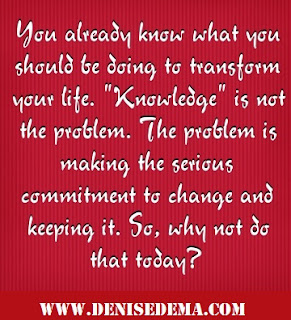Why is it that we tell ourselves we want certain things, but we don’t take action? We might have the best of intentions to make certain changes in our lives, yet we do not follow through on our resolutions?
Does that mean we are lazy or undisciplined? Are we afraid of failure? Are we holding on to limiting beliefs about ourselves?
We get frustrated when we think and say we are committed to wanting something for ourselves, but no action follows that voice of commitment.
When you fully commit to something, action always follows thought. There is no question, no debate, no doubt or struggle. You don’t wonder whether you will take action or not. Commitment goes beyond making a choice. People gain a mysterious strength and resolve when they make a commitment.
Commitment is a unique personal experience. There are many types of commitment strategies, yet the best personal style of commitment comes from a deep emotional awareness within yourself. Often our commitments are invisible to us and we don’t think about them as commitments, it is what we do naturally. And that’s the whole point.
Recall a time in your life when you were committed to something. You were so deeply committed that there was no doubt in your mind, and taking action was almost automatic and effortless. Take some time to answer the following questions to discover the underlying structure of your own personal commitment strategy.
- When and where were you committed? Was it a commitment you made to yourself or others? Were there any external influences?
- What were some of the actions you took?
- How did you go about taking action? What was your strategy for taking action? Did you write down your goal/ commitment or visualize your achievements? Did you call a friend or work with a professional coach? What skills or capabilities did you use?
- What were some of the emotional reasons why you were committed? Reflect on the values and beliefs that motivated you to take action and follow through on your commitment.
- How did you benefit from taking action? What was the cost of not taking action at all?
- How did you think and feel about yourself as a person? Maybe you felt like a successful individual or a compassionate person.
- How did your commitment impact others?
Understanding and modeling your personal commitment strategy will help you follow a path to achieve your goals. There is a difference between interest and commitment, interest gets you started, but your commitment will keep you there even after your interest leaves. When you commit to something, there are no excuses, only results. Get started today and book a complimentary coaching session at Business and Life Management Coaching.
















